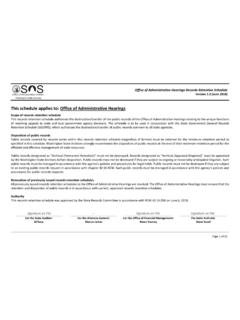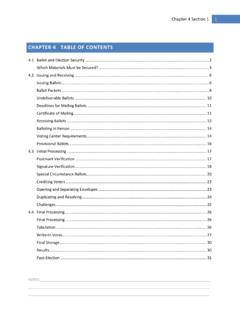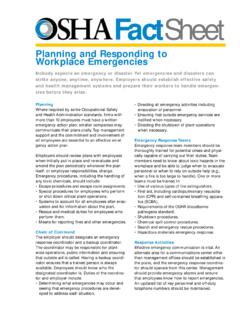Transcription of What Not-for-Profits Need to Know About Tax Compliance
1 What Not-for-Profits Need to Know About Tax Compliance 1-2013. Table of Contents Introduction 3. Tax-Exempt Basics 4. What is tax-exempt status and why does my organization need it? How does my organization become a tax-exempt entity? Do I need an attorney or CPA to help my organization gain tax-exempt status? Once my organization receives tax-exempt status, how do I maintain it? Does tax-exempt status mean I am exempt from all taxes? What is Unrelated Business Income, and why should I care? Routine Reporting Requirements 9. What are the reporting requirements expected of my organization?
2 Why does a tax-exempt organization have to file a tax return? What is a Form 990? Does every tax-exempt organization have to file a Form 990? Who typically prepares the Form 990? Where can I obtain a Form 990? What are the key pages in a Form 990? What are the reporting requirements if my organization offers a retirement plan? What are the State & Local reporting requirements expected of my organization? Unrelated Business Income 14. What are common sources of taxable income? What exclusions are available to reduce tax? Can we deduct expenses? What is meant by continual losses?.
3 Considerations for Organizations with Employees 16. What is the difference between employees and independent contractors? What if my organization has interns or volunteers? What if my employees use an expense account? Are fringe benefits taxable? Does the IRS regulate executive compensation? (continued next page). 2013 Jacobson Jarvis & Co PLLC. All rights reserved. 1. Tax Considerations Associated with Fundraising 19. Do I need to do anything special relative to fundraising events? Are there any special licenses or permits required to hold a fundraising event? What if we hire a professional fundraiser to help with our fundraising activities?
4 What if we want to hold a raffle? How are membership dues treated from a tax perspective? What is a qualified sponsorship payment? What are fiscal sponsorships? Is there any special language we need to include in our donor thank-you letters? Political & Lobbying Activities 23. Can my not-for-profit become directly involved in political campaigns or other political activities? What is a Political Action Committee? If we are a 501(c)(3) organization, can we lobby for changes that will impact our organization and its mission? Audits & Inquiries 25. How can I minimize my chances of an IRS audit?
5 What should I do if I get audited or get a letter from the IRS? What happens if I lose my tax-exempt status? Form 990 Review Checklist 27. Glossary 29. Other Resources 40. Contact Us 40. 2. Introduction Whether your organization is in its beginning stages or already established and growing rapidly, it is common to become so focused on mission-build- ing that tax Compliance is an afterthought. This is certainly understandable . after all, the infectious passion and energy of our not-for-profit community is one of main reasons that Jacobson Jarvis is proud to work exclusively with this sector.
6 However, many organizations can engage in activities that are done com- pletely in good faith, only to realize that an unintentional oversight has placed the organization at risk. We know this because we have worked with hundreds of executives and board members at organizations large and small to navigate the complexities of tax laws. We have seen it all, and our experi- ence is what inspired us to develop this resource. This booklet is designed to educate and inform organizations just like yours About the basics of tax Compliance , and to help your organization stay aware of the common pitfalls that can carry serious consequences if left unaddressed.
7 It is not intended to be a substitute for professional advice. However, it covers a range of tax-related issues that your organization can leverage for directional purposes, including applying for and maintaining tax-exempt status, routine reporting requirements, employer obligations, and special considerations for fundraising and political lobbying activities. More importantly, this booklet is intended to provide foundational knowledge About tax Compliance that can be passed along to board members and other leaders within your organization so that you can more confidently focus on what you do best your mission.
8 3. Tax-Exempt Basics What is tax-exempt status and why does my organization need it? To receive tax-exempt status means that, under the federal income tax code, an organization has been granted an exemption from federal income tax if it is deemed to satisfy a charitable purpose. Organizations must apply for tax-exempt status and it is only granted once an application has been reviewed and approved by the IRS. Tax-exempt status is not easy to obtain and not every organization that ap- plies is granted tax-exempt status. Even if an organization has an impor- tant mission and focuses exclusively on charitable activities covered under a section of the tax code, it may not be approved if its application is not in the proper format or does not include all of the necessary informa- tion.
9 For example, merely filing a Form 990 tax return will not give you tax-exempt status. Your organization still needs to file paperwork within a year of formation with the federal government, in order to have its not- for-profit status formally approved. If tax-exempt status is not granted, the organization will be subject to federal income tax, and contributions made by donors will not be tax deductible. The section of the code that describes the types of organizations that are exempt from tax, upon acceptance of an application, is section 501. These types of organizations are grouped into sub-sections, such as 501(c)(3), which address charitable, religious, scientific, literary and other charities.
10 Other sections address other types of tax-exempt entities, such as 501(c). (6) trade associations, 501(c)(7) social clubs, and 501(c)(4) social welfare organizations. This booklet focuses primarily on the tax requirements of 501(c)(3) charitable organizations. The primary difference between the 501(c)(3) entities and the others is that individuals can receive a tax deduc- tion for donations to (c)(3) organizations on their personal tax returns. Once the exemption is received, the not-for-profit organization will not generally have to pay federal income taxes on donations and other funds directly related to its charitable purpose.
















